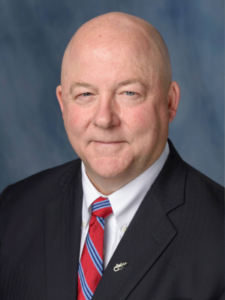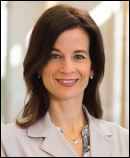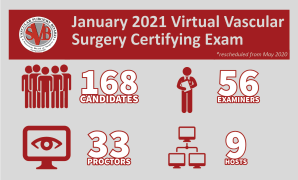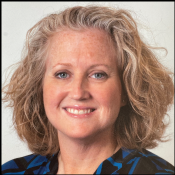Vascular Surgery Board Mission Statement
The Vascular Surgery Board of the American Board of Surgery serves the public and the specialty of vascular surgery by providing leadership in surgical education and practice, by promoting excellence through rigorous evaluation and examination, and by promoting the highest standards for professionalism, lifelong learning, and the continuous certification of vascular surgeons in practice.
Message from the Chair


My mom Mary Anne, as she got older, often reflected on seeing young families with babies crying by reminiscing and saying “the days will last forever, but the years will fly by.” That seems an appropriate feeling as I reflect on my past two years as chair of the Vascular Surgery Board (VSB). With the governance and organizational redesign at the American Board of Surgery, the VSB two years ago also undertook significant structural changes, including allowing the VSB to select its own chair. Ash Mansour, who was to serve as the next VSB chair, stepped down when he was selected to become a member of the ABS Board of Directors, a wonderful recognition of Ash’s leadership skills and a significant benefit for vascular surgery. Concurrently, the VSB also decided that subsequent chairs could come from any of its sponsoring vascular societies. The term of the chair/vice chair, which had been three years each, also was changed to one year each. The position of vice chair-elect was also created to allow a continuity of leadership and more leadership opportunities on the VSB with progression to chair over the period of three years. With this reorganization, new committee chairs for the VSITE, CCA, Research and Education, and Communications Committees were empowered to effect meaningful and lasting impact on the educational and training structure of vascular surgeons.
Overall, I think these changes have been impactful towards my singular stated goal when I took over as chair, which was to make the inner workings of the VSB clearer to the clientele we serve, namely you, the vascular surgery diplomates. My plan was to attempt to make completely transparent the workings of the VSB. In addition to changing the leadership structure, we also established larger writing committees for each of our examinations that are now populated by a diverse, energetic, often young group of vascular surgeons from across all of vascular surgery, including community and academic surgeons. The membership of these writing committees was selected from volunteers who responded to our Request for Applicants (RFAs), in which we literally asked, “Who wants to serve?” We also democratized the process for selecting our certifying examiners. Rather than appointing individuals recommended by VSB members, or other senior vascular surgeons (a “who you know” process), we now select our CE examiners largely from the membership of these examination writing committees; that is, individuals who have given their time selflessly and who have excelled in that role and as a reward for their service. This also importantly should assure the vascular community that we are using well-trained content experts in our testing process.
During this horrible pandemic, we have effectively used various social media platforms to better communicate with our vascular surgeon diplomates, especially our trainees, in an improved manner to let them know that we were sensitive to their educational needs, especially as many vascular surgeons became frontline COVID-fighters. We literally pivoted the entire testing process to online/virtual and delivered high quality exams that we insisted remain high quality. During the pandemic, the VSB reduced operative case requirements and mandatory weeks of clinical service/training required in order to qualify for applying for board certification, in consideration of the adverse impact of the pandemic on their training programs and clinical services.
The VSB has also continued to solidify our collaborative partnership with the other vascular organizations involved in vascular surgery education. The semi-annual Vascular Surgery Summit has continued virtually, and allows stakeholders to gather to focus on the process of delivering the best trained vascular surgeons to the public, who are both safe and skilled. Ongoing dialogues between leadership of the SVS, APDVS, RRC and the ACGME were less focused on boundaries and more focused on what was in the best interests of training our residents and fellows and supporting our practicing diplomates. This process of providing educational content and the best training for our learners stays at the forefront of all of those involved in this process! While a full partner with the other specialty boards in the house of surgery of the ABS, our board certification by the VSB not only symbolizes the independence of vascular surgery as a separate specialty from general surgery, but is the most powerful symbol of the unique expertise of our diplomates in the diagnosis and management of circulatory disease, and clearly differentiates us from other practitioners in cardiac surgery, cardiology, interventional radiology, and others.
Finally, I also want to take this opportunity to thank the incredibly dedicated and talented staff at the American Board of Surgery. Being a part of the “house of surgery” was critical during the COVID pandemic in pivoting our testing to a completely virtual experience, an undertaking of enormous proportions, and a process that has been overwhelmingly appreciated by the candidates as reflected in post-exam surveys. Psychometricians and ABS staff members made this possible. Thanks go to Aly Maloney, Patricia Just, Carol Barry, Marni Grambau, Michelle LaPlante, Kara Webb, Zachary McKenna, Jessica Schreader, Andrew Jones, and Mark Hickey, who were all critical in not only maintaining the highest quality of VSB testing content, but also in an almost seamless process. A special thanks goes out to Nicole Gifford, the VSB liaison, who always does her best to keep us progressing and organized! Finally, the leadership of President and CEO Jo Buyske, Vice President (formerly Associate Executive Director for Vascular Surgery) Bruce Perler, and Vice President (SCORE) Mary Klingensmith, was instrumental in allowing the VSB to continue to evolve and focus on providing the safest and best trained vascular surgeons for our patients. They provided us the platform to provide the first certifying examination using imaging, and for this, we as a vascular community owe a big thanks to the ABS.
As I reflect on the past two years as VSB chair, I am proud of the work the VSB has accomplished with governance restructuring, virtual testing, a reworked CE with many completely new clinical scenarios, moving to an online CCA focused on learning rather than testing, now a modular assessment with a venous component for those who choose, and documenting that the VSITE is predictive of passing the QE (see abstract to be presented at the SVS VAM).
Most importantly, our work is just beginning! We have identified future opportunities to continue to improve the educational process for all vascular surgeons. In the next few years, the VSB, in collaboration with the APDVS, plans to roll out Entrustable Professional Activities (EPAs) to address the issue of assuring independence when residents and fellows finish training, and to assure that our trainees are finishing with a technical skill set that we deem to be of the highest quality. In addition, the blueprint used to determine the content of our examinations will undergo comprehensive redesign, to more accurately reflect what the contemporary vascular surgeon should know and be tested on, and to align that content with the content of VSCORE.
The VSB is in tremendous shape with future chairs Tom Huber and Kellie Brown, and all of the dedicated members of the VSB community poised to help take the training of vascular surgeons to an entirely new level. As I close this chapter of my own personal development as a leader and educator of vascular surgeons, I concur with my mom that the days sometimes were long (try 11 hour Zooms), but the years flew by and were amazingly rewarding! I thank you all sincerely for your confidence in allowing me to serve our specialty in this role.
Sincerely,
Gilbert R. Upchurch, Jr.
VSB Chair 2019-2021
VSB Director Spotlight


Bernadette Aulivola, M.D.
Chair, VSB Communications Committee
Dr. Bernadette Aulivola joined the VSB in 2017, when she was elected to represent the Vascular and Endovascular Surgery Society (VESS). She is the chair of the VSB Communications Committee, and works closely with the communications manager of the ABS to develop communications specifically for vascular surgery trainees and vascular surgery diplomates, including email campaigns, newsletters and social media items. She previously served as section chair of the board’s Certifying Exam Committee.
“My focus as the communications chair for the VSB is to facilitate the free flow of information to the diplomates of the Vascular Surgery Board regarding what the focus of the VSB’s work and mission is all about.”
Following undergraduate education at the State University of New York at Stony Brook and medical school at the Washington University School of Medicine in St. Louis, Dr. Aulivola completed residency training at Rush University Medical Center/Cook County Hospital in Chicago, followed by a clinical fellowship in vascular surgery at Beth Israel Deaconess Medical Center in Boston.
Dr. Aulivola is the director of the Division of Vascular Surgery and Endovascular Therapy as well as vice chair for Diversity, Equity and Inclusion in the Department of Surgery and medical director of the Vascular Noninvasive Lab at Loyola University Health System. She also serves as a professor of surgery at the Loyola University Chicago Stritch School of Medicine.
In addition to her professional roles, Dr. Aulivola is treasurer of the Midwestern Vascular Surgical Society, chair of the Society for Vascular Surgery Resident and Student Outreach Committee, and vice chair of the Society for Vascular Surgery Task Force on Equity, Diversity and Inclusion. In her free time, Dr. Aulivola enjoys running, travel and family time.
2020 Continuous Certification Assessment Summary
The Vascular Surgery Continuous Certification Assessment (CCA) was introduced in 2019, to replace the traditional Maintenance of Certification Exam. In 2020, a total of 311 vascular surgery diplomates completed the assessment, with all but one passing. Of these 311 diplomates, 28 also hold an active general surgery certificate, and one holds an active surgical critical care certificate.
The following graphs represent diplomate perceptions about the Vascular Surgery CCA. The survey, administered following completion of the assessment, received a 98% response rate. Please note that not all survey questions are included below.


2020 Vascular Surgery Certifying Exam
Delivered January 2021


The 2020 Vascular Surgery Certifying Exam (CE), originally scheduled for May 2020 but postponed due to the COVID-19 pandemic, was administered in a virtual format in January 2021. This exam was the fourth virtual exam to be administered by the ABS in the 2020-21 academic year, but the first to utilize image sharing for the cases. Post-exam surveys indicated satisfaction with the image sharing process from both candidates and examiners.
As seen in the image above, 56 examiners saw 168 candidates over the course of the two-day exam. The virtual format utilized the Zoom video conferencing platform, and required nine Zoom room hosts in addition to 33 proctors, who were responsible for observing each exam to ensure exam security and reliability.
Pass rates for the virtual exam were on par with those from the traditional in-person exams, though just slightly higher. The overall pass rate for 2020 was 98%, compared to 94% in 2019. For more information about pass rates for vascular surgery exams, please visit our public data site.
Given the success of all virtual exams administered thus far by the ABS, the July 2021 Vascular Surgery CE will also be administered virtually.
2020 Vascular Surgery CE Candidate Feedback
After the exam, the ABS used surveys to collect feedback from all exam participants. The majority of respondents indicated high levels of satisfaction with the remote exam, citing that the exam was well-organized and well-planned. Candidates appreciated the convenience, cost savings and decreased stress associated with not traveling, and many said that the exam experience was as they expected or better.
“It was much more convenient to me to not have to disrupt my practice by leaving for several days prior to the exam in preparation to take the exam,” said one candidate. “I was able to sit in my own office to take the exam, which was much more comfortable/ relaxing, and there was no travel or lodging expense.”
“I was very impressed with the whole examination set up and the kind of ‘chose your own adventure’ aspect of clicking the different stems and images depending on what you asked for,” said another. “I liked this a whole lot more than my experience in-person running between hotel rooms when I took the general surgery [oral exam].”
“I have never had this experience,” offered another candidate. “I found it user-friendly and relatively low-stress to use. Having the proctor be available was excellent, knowing if something happened there was someone easily accessible to assist.”
However, not all candidates preferred the virtual format to the in-person experience. “Given the circumstances, I think that the ABS did a great job with the exam and there were no glitches. Having taken the General Surgery Certifying Exam in-person, I still prefer to take the exam in-person. Despite the cost, I liked getting away from my normal environment to be able to solely focus on the exam for several days. I remember going through scenarios with different candidates as well. I still think there is value to the in-person exam.”
COVID Modifications for 2021 Graduating Trainees
The VSB understands that the COVID-19 pandemic continues to put a strain on surgical training, and that graduating vascular trainees may have difficulty in meeting some of the requirements that are needed to apply for initial certification in vascular surgery. In recognition of this, the VSB has made the following modifications to training requirements for individuals completing training in the 2020-2021 academic year:
- Non-voluntary offsite time that is used for clinical or educational purposes can be counted as clinical time. The types of activities done in this time should be documented by the program.
- The VSB will accept 44 weeks of clinical time (including the non-voluntary time) for the 2020-21 academic year, without the need for pre-approval, permission or explanation.
- The VSB will accept a 10% decrease in total cases, or 225 major vascular cases, without the need for further documentation. Those who fall short of this minimum threshold may petition the VSB to grant credit for their final year.
- Program directors are entrusted, as they always are, to make a decision about the readiness of the resident for independent practice. If a trainee falls below the minimum thresholds for cases or training time, and the program director nevertheless endorses them as ready for independent practice, the VSB will seek a more detailed supporting statement.
- Trainees should assess their own progress towards the standard requirements in terms of rotations, cases, and specialty-specific requirements. Trainees should make a remediation proposal for gaps, and share with their program directors.
These hardship modifications apply to the graduating class of 2021 only.
2021 Dates to Remember
Certifying Exam: July 13-14
Will be administered virtually
Qualifying Exam: October 4
Continuous Certification Assessment: August 30-November 8
Registration available August 2
VSB In Memoriam


January 12, 1971 – May 21, 2021
VSB CE Examiner 2015 – 2018
Robyn was a skilled vascular surgeon with unparalleled compassion for her patients, an inspiring educator and mentor to her trainees and students, and radiated a joy and warmth in her smile that lit up every room she was in. Vascular surgery and those who knew her were truly enriched by who she was. We express our deepest condolences to her family, colleagues, and her so many friends who were truly blessed to know her.
